Why does bowel cancer target young people? Be alert to these signs of bowel cancer
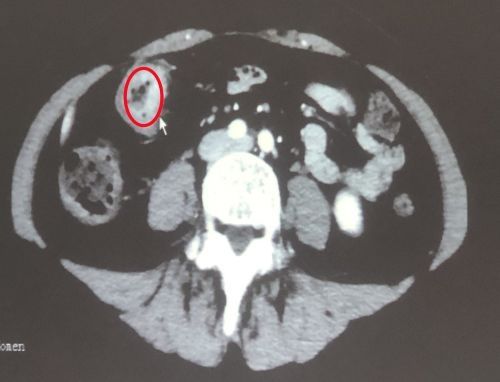
Pre-treatment image shows: there is a tumor (red inside the circle).
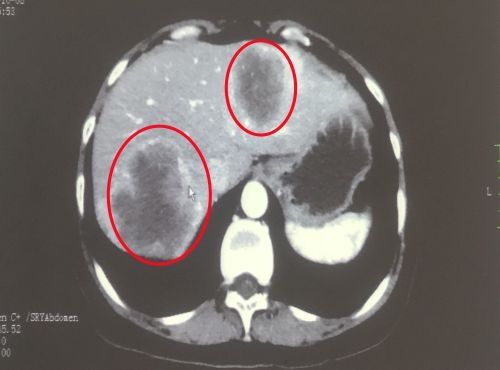
The image before treatment showed that there were multiple metastases in the liver (in red circle).

The colorectal tumor multidisciplinary team of Hunan Provincial People’s Hospital discussed the condition.
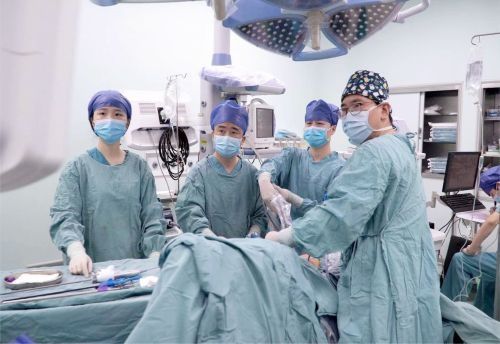
Colorectal and anal surgery and hepatobiliary surgery jointly perform colon and liver tumor resection for patients Operation.
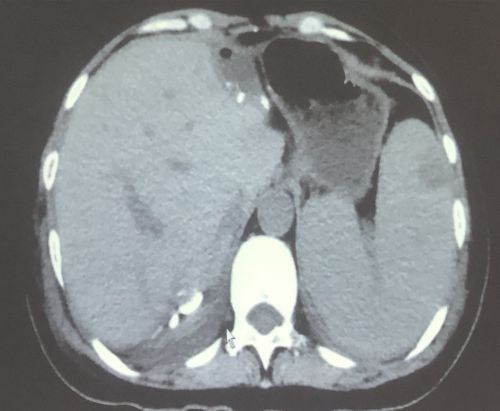
Postoperative images showed that the liver metastases disappeared.
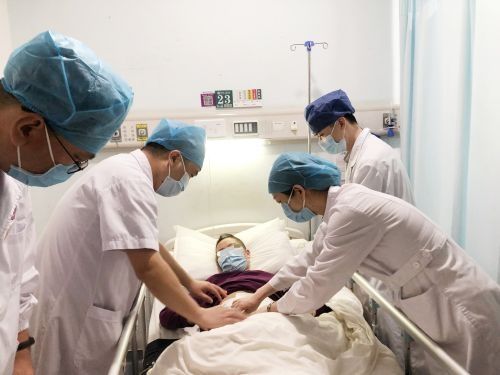
The colorectal and anal surgeons check the patient’s recovery after surgery.

Xiao Zhigang, director of colorectal surgery, introduced the incidence of colorectal tumors to the media.
Changsha 43-year-old Ms. Lin has been suffering from repeated abdominal pain and blood in the stool for the past six months. thing. When she was admitted to the Department of Hepatobiliary Surgery of Hunan Provincial People’s Hospital because of a “liver mass” found in her physical examination, she was told that the multiple masses on the liver were caused by colon cancer metastasis.
After discussion by experts from the colorectal tumor multidisciplinary team of Hunan Provincial People’s Hospital, Ms. Lin received chemotherapy + targeted drug therapy, and the mass was significantly reduced, and then the colorectal anal tumor was shrunk. The team of Director of Surgery Xiao Zhigang and the team of Professor Cheng Wei of Hepatobiliary Surgery performed simultaneous resection of colon and liver tumors for him. The resected colon tumor is about the size of an adult fist, and the resected liver and tumor account for about 30% of the whole liver.
Xiao Zhigang said that in the past, patients with colorectal cancer combined with liver metastases like Ms. Lin had basically no chance of surgery; now, some of these patients have undergone conversion therapy (chemotherapy). , targeted drugs, immunotherapy, etc.), radical surgical resection can be performed to regain vitality.
April 15-21, 2022 is the 28th National Cancer Prevention Awareness Week. Xiao Zhigang, Director of Colorectal and Anal Surgery, Hunan Provincial People’s Hospital, said that colorectal cancer is a common According to the latest “Analysis Report on the Epidemiology of Malignant Tumors in China”, there are 388,000 new cases of colorectal cancer and 187,000 new deaths in urban China, ranking third among all malignant tumors. . With the changes in the dietary structure and living habits of Chinese people, the incidence of colon cancer is showing a younger trend. The data show that in 2021, compared with 2004, the incidence of colorectal cancer in the age group of 30 to 39 years old in my country will increase by 19.8%.
Why does bowel cancer target young people?
Why the incidence of bowel cancer is getting younger, Xiao Zhigang summed it up with “sit out, eat out, suck out, and miss out”:< /p>
1.Sit out – always sedentary
Compared with the uncles and aunts who like to play Tai Chi and dance square dance, young people either sit in front of the computer and work overtime, or Ge You lie down and play on the mobile phone. Foreign studies have found that people who work sedentary for a long time will increase the risk of bowel cancer by about 44%, and proper exercise can reduce the risk of rectal cancer and colon cancer. This is because sedentary people have slow bowel movements and poor blood circulation in the abdominal cavity, pelvis, and lumbosacral region, which all increase the risk of bowel cancer.
2. Eat it out—too greasy< /p>
It seems that the life of urban young people is inseparable from takeaway and fast food. Western fast food is high in calories, and there is still a layer of oil on the bottom of the bowl after taking out; and those fried and grilled meats will form carcinogens on the surface. If you eat too much, your gut flora makes more carcinogens; redMeat (beef, pork, and lamb) and processed meats (sausage, burgers, ham, bacon, canned meat, etc.) increase the risk of colon polyps and colorectal cancer.
3. Smoke it out – smoking and secondhand smoke< /p>
According to the World Health Organization’s “Body under the Influence of Tobacco”, among the various chemicals that make up tobacco, at least 70 are known to cause cancer. Therefore, smokers have a much higher risk of developing colorectal cancer than non-smokers.
4. lack out – insufficient intake of whole grains, fruits and vegetables
According to the monitoring results of nutrition and health status of Chinese residents in my country from 2010 to 2012, the average daily intake of vegetables per standard person in urban and rural areas in my country was 269.7g, and the intake of fruits was 40.7g. It is far from the requirement of “one pound of vegetables and half a pound of fruit” advocated by nutritionists. In addition, many people eat polished rice and white flour for a long time, and rarely consume coarse grains. The dietary fiber in fruits, vegetables and whole grains can help reduce the risk of colorectal cancer.
Be alert to these signs of bowel cancer
”, which is related to people’s living conditions and eating patterns. If the following five “signals” appear, consider the possibility of colorectal cancer:
1. change in bowel habits Early diarrhea, constipation, or alternating diarrhea and constipation may occur. Some people also show increased stool frequency, frequent bowel movements, and tenesmus. In addition, the stool will also appear deformed, thin and so on.
2. blood in stoolblood in stool is mainly caused by tumor rupture, bloody stool Dark red, mucus stools, or foul-smelling pus and blood stools.
3. abdominal pain and discomfortThe tumor continues to grow, and some patients will experience abdominal distension Pain and discomfort.
4. anemiatumor growth requires a large blood supply, so as the tumor grows Gradually increase, the patient may appear different degrees of anemia. In addition, blood in the stool can also lead to anemia.
5. abdominal masstumors can grow into the intestinal lumen, 60%~ In 70% of patients in the middle and late stages, a firm mass can be palpated in the right mid-abdomen, which is a sign of right colon cancer.
How can colorectal cancer be prevented?
1. Arrange meals reasonably (eat more fresh vegetables, fruits and crude fiber foods, and moderate intake of calcium, molybdenum, selenium, etc.); < /p>
2. Actively treat ulcerative colitis, colon polyps, intestinal Crohn’s and other benign intestinal diseases;
3. Participate regularly Screening and screening (fecal occult blood test, rectal examination, colonoscopy, etc.);
4. Develop a good lifestyle (no smoking, no alcohol, a balanced diet, participating in Physical activity, weight control to prevent obesity, etc.).
5. Strengthen selenium supplementation Selenium is a killer of cancer cells, which can form an internal environment that inhibits the division and proliferation of cancer cells in the body. In medicine, selenium supplementation with Selenium Weikang tablets is often used after cancer surgery to increase blood selenium content, which can significantly control the deterioration of the disease, reduce the toxic and side effects of chemotherapy and radiotherapy, and help anticancer drugs improve their efficacy.
Early prevention and early treatment, do a screening
According to the Shanghai Anti-Cancer Association In accordance with the 2020 version of “Recommendations for the Screening and Prevention of Common Malignant Tumors in Residents” issued by the Cancer Hospital Affiliated to Fudan University, the following groups belong to the high-risk group of colon cancer and should go to the hospital for colonoscopy regularly:
Asymptomatic people over 1.45 years old;
2. People over 40 years old with anorectal symptoms for two weeks;
3 .Patients with ulcerative colitis for a long time;
4. Population after colorectal cancer surgery;
5. Population after treatment for colorectal adenoma;
6. Immediate relatives with family history of colorectal cancer;
7. Diagnosis Immediate relatives of patients with hereditary colorectal cancer who are over 20 years old.
Liang Hui Fang Zhixue